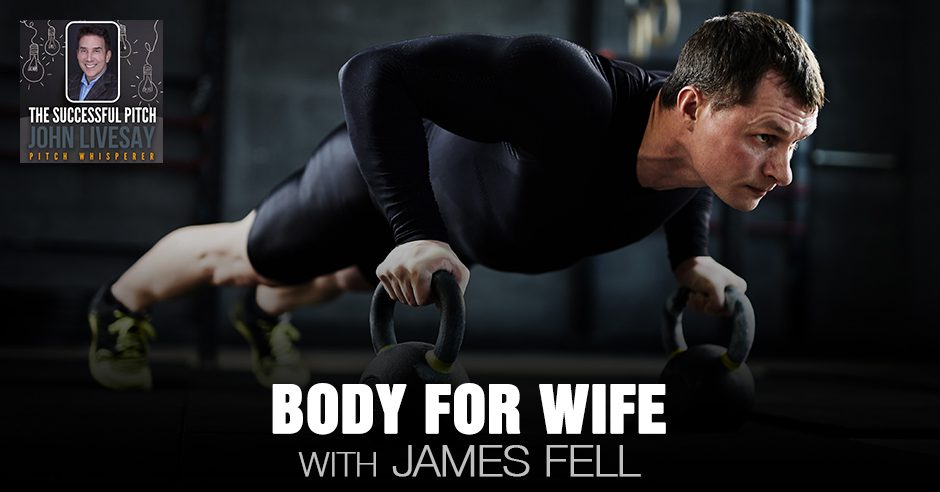Body For Wife With James Fell
Posted by John Livesay in podcast0 comments

Losing weight is one of the most challenging part of many people’s lives these days. James Fell, a highly regarded science-based motivator for lasting life change, spills some details about his book, how to embrace change in life, and how he found purpose as a speaker. He takes us back to his own story and how he got the inspiration to write his books. As he shares the foundation of being fit, he also breaks down his fitness techniques into three simple stages – learn, prepare, and do – and the five stages on how to make behavior change.
—
Listen to the podcast here
Body For Wife With James Fell
My guest is James Fell who is an expert in transformation, not only of our bodies but our mind and our careers. His website is called Body for Wife because he wanted to get in shape before he got married. He’s taking those lessons he learned and he allows us to learn how to transform any area of our life. He says, “When you have a vision that pulls you towards the future, you don’t have to push yourself so hard.” He identifies the keystone habits that we need to start doing in order to change. He said even planning is a form of taking action.
James is a highly regarded science-based motivator for lasting life changes with millions of readers around the globe from his two books. He has the mission of helping people achieve sudden insight into what inspires them to live the life they know they’re meant to be living. He’s got two books, the first one was Lose It Right: A Brutally Honest 3-Stage Program to Help You Get Fit and Lose Weight Without Losing Your Mind. The other one is called The Holy Shi!t Moment: How Lasting Change Can Happen in an Instant. James, welcome.
Thanks so much for having me, John.
You are very transparent on your website, which is Body for Wife, as opposed to Body for Life, about your own journey. I would love to have you take us back to your own story of origin.
The whole Body For Wife thing traces back to being 25 years old and having realized that I let myself get in pretty terrible physical condition. I wanted to propose to my then-girlfriend and just as an impetus to change that, “I’ll get in shape before I propose.” Years later, the Body for Life program was popular and I had a bunch of friends that were on it and I made a joke one day that I was on the Body for Wife program and they all laughed. It became this in-joke between friends. What happened with my transformation to becoming a writer was that I was 40 years old and I’d been working in the business field for a dozen years in and doing quite well, but it wasn’t anything that I was super passionate about.
I was making money and supporting my family and I didn’t hate my job, but I certainly didn’t love it. One thing I did love was writing. Before my MBA, I did a Bachelor’s and a Master’s degree in History and writing was something that I used in my job all the time and something that I enjoyed. I thought, “I want to be a full-time writer.” Health and fitness were something that I knew a lot about. I found a position that allowed me to work twenty hours a week in an executive director role and then threw myself into this writing career. Within a year, despite being a Canadian living in Canada, I was a fitness columnist for the Los Angeles Times.
[bctt tweet=”Planning is a form of action.” username=”John_Livesay”]
From there, it snowballed and I evolved over time into less health and fitness and more in general motivation because I found that when it came to losing weight, there were many different ways to do it. There’s a line in the book that there are more ways to get in shape than there are beers in a Munich autumn. I thought, “I’m going to focus more on motivating people to find the way that works best for them.” Over time, that expanded out into this new book being a general science-based motivational book that allows them to do anything including changing their bodies, but also changing their careers or their relationships, going back to school, their mood state, anything that they would like to change.
Let’s start at the foundation of getting fit because how you do one thing is how you do everything. It seems to me that that’s a common theme. If you can figure out how to master your eating and your health, then you can apply those skills and mindset to your career. Would that be accurate?
It absolutely is. It was talked about in Charles Duhigg’s book, The Power of Habit. It’s called a keystone habit and I was talking about this before Duhigg’s book came out that people who lose weight and keep it off, who transform their lifestyle habits in terms of eating and exercise, they develop a very powerful skillset. Because losing weight is one of the hardest things people will ever do, which explains why the failure rate is so high. When you train yourself to exercise on a regular basis and train yourself to eat better in an environment that wants you to be fat, you’re constantly bombarded with messages and the ease of ordering tasty treats. To be able to build that discipline and that routine that allows you to counter those environmental pressures, then those are transferable skillsets that you can then apply to other aspects of your life that can be very rewarding in your career. I witnessed this again and again. I witnessed over and over that people that transformed their bodies didn’t stop there. They moved on to change their careers, their relationships and their entire lives.
In this book about not losing your mind because people can get so frustrated and overwhelmed, you broke it down into three stages: learn, prepare and do. Let’s talk about how we can come up with a keystone habit using those three stages. What would you suggest?
I would say a great place for anyone to start is to start walking. There are a number of reasons for that. There was a piece that I wrote called, “Are you a temporarily embarrassed fitness model?” It’s a play about Temporarily Embarrassed Millionaires. The point is that many people are sold on this idea via magazines in the weight loss industry that they’re temporarily embarrassed fitness models. If they do this one weird trick or whatever it is, they’re going to have rippling abs, bulging biceps, massive packs and all that stuff. The reality is that only a very small portion of the population has the genetics, the time and the will to create a physique that looks like that. Instead, we should focus on what is achievable in the early stages and go from there and see where it takes us.
The thing about walking is the benefits to it are tremendous. It is the number one form of exercise in the world and it is very easy. It doesn’t require a gym membership. You just put on your shoes and you go out your door. It can give you time to think or listen to a podcast or take your phone with you. It’s like, “I need to call my mom because I haven’t talked to her for a while.” I will often put my headphones in and call my mom and go for a walk. The thing is starting that habit gets you in the mindset of, “I exercise now. This is a part of who I am. I am a person who is regularly, physically active.” From there that can get you thinking about, “Since I’m physically active, maybe I should start considering what I put in my mouth.”

Losing Weight: People that are fairly entrepreneurially minded are in a position to have a transformational role.
It can create baby-step changes there. If you get to the point where you’re going further and further in your walks, you’re finding that you’re enjoying it and you’re getting more energy, you may decide that you want to try something more ambitious. Maybe you want to run, maybe you want to start getting a personal trainer to come over and teach you how to do some things at home. Maybe you want to join a gym, maybe you want to qualify for the Boston Marathon. Who knows? You never know where that’s going to take you.
Let me go to the new book, The Holy Sh!t Moment. What motivated you to write this? I’m interested to know. We can’t transform our bodies overnight but you say lasting change can happen in an instant.
We can’t transform our bodies overnight, but we can change our minds very quickly. That was something that I had witnessed in my years of writing about health and fitness. A lot of people went through this dramatic change of thought where they knew that this time, it was going to work. The idea for the book came to me on a bike ride. I’m one of those guys that I do a lot of my best thinking when I’m either riding my bike or out for a run. How it popped into my head was that I was riding my bike and listening to some music and having a great day. I was thinking about what my next book was going to be about. I hadn’t come up with a great unique story idea yet.
I saw this guy running toward me and he was wearing a Boston Marathon shirt. It popped into my head like, “I did that. I qualified for and ran the Boston Marathon.” That started a bit of a cascade of remembrance because it got me thinking about how things really changed because when I was younger I was the guy in the back of the pack in gym class when we had run. I was the guy that got picked last when they were selecting sports teams. There I was, I did something. I didn’t just start running marathons. I qualified for Boston, which I don’t know if you know anything about it, but it’s hard. It made me think about all of this transformation that I’d gone through from who I used to be and who I became.
I went from being a terrible student to being a good student and lots of other different things that changed. It made me remember that there was a transformative experience I had where I went from flunking out of university to acing my courses. It was a single life-defining moment that I had. I fondly remember that experience where my life changed in just the space of a few seconds. I could have just left it right there, but then it started to continue to turn over in my head. This idea popped in saying, “I wonder what the science is behind that.” The whole life-changing epiphany, what do we know about what’s happening in a person’s brain? All of a sudden, I screeched to a halt on my bike and almost fell over because I forgot to unlock my feet from the pedals.
Let’s talk about that because one of the things that we know scientifically is exercise can be an antidote to despair, but what other things can people do? You are a speaker to sales organizations like I am. Salespeople have to deal with a lot of rejection. What tips do you have for your audiences on how to deal with rejection and getting despair feelings?
[bctt tweet=”What is your keystone habit?” username=”John_Livesay”]
That traces back to that life-changing moment that I had when I read a quote that says, “Action is the antidote to despair.” If a person is on a mission, the life-changing moment is about being delivered a powerful vision about something you feel that you must fulfill. You’re on a mission and it’s going to happen no matter what. You are endlessly energized to make it happen. I experienced that with my writing career where there was a lot of rejection. It was one of those things where you knew that there were going to be failures, but you were going to stay the course. You are going to be adaptable. You are going to figure out what didn’t work and then try something different. You’re endlessly motivated because there are still these little bits of progress.
This is one of the things in the book. The neuroscience behind the life-changing moment is the role of dopamine. Dopamine is called the neuromodulator of exploration. When we have a transformative experience like this, there’s a big rush of dopamine that says, “This is exciting, this is powerful and this is potentially very valuable, so you should chase after it.” It pushes you along this path. It’s the ongoing reward of dopamine that is absolutely critical because dopamine recognizes progress. If you do something that even is a little bit helpful in helping move you toward that reward, dopamine gives you a little positive boost that says, “You’re doing it. You’re making progress. Keep going.” That is something that can drive you forward for years. As long as you’re making little bits of progress, those failures, that rejection doesn’t matter.
I’ve heard it said that our brains crave progress. You’ve just explained the science behind why that’s true.
That’s what it’s about. There’s an example in the book of a woman. She worked in a call center for a health insurance company. She was very helpful to a caller one day when she went way above and beyond the call of duty from what her job described. After her shift, she realized that she was meant to do much more with her life than just work in a call center. She ended up going back to university and eventually getting her PhD in Pharmacology and now works in health policy in DC. She’s been immensely successful in speaking at illustrious universities and getting published in prestigious journals. It was years and years of toil and effort that it was that constant role of dopamine that pushed her through semester after semester and doing her research. In my writing career, it was getting published in that small magazine for the first time and then getting published in the LA Times and then having my Chicago Tribune articles being published in dozens of papers around the world and having viral blog posts. Each little thing, each little time, even though there was also a lot of rejection and a lot of criticism, there were still those successful milestones that kept pushing me and continue to push me to this day.
James, what you said there is so valuable for everyone reading because if I look at you from the outside looking in, I’m like, “He’s got it all. He’s handsome, fit and he has a beautiful wife. He’s published everywhere. He’s never had a bad day in his life. He doesn’t understand my struggles. He never eats anything bad. He’s never tempted to eat anything bad. Anything he writes turns the turns to gold. He never gets rejected.” It’s great that you share that even while there’s some progress, there’s going to be some rejection and struggle. People can say, “It’s not all or nothing.” I want to talk about these five stages that you have in your book on how we make a behavior change. It’s so well done from a standpoint of exercise, but we can transfer that to let’s say a group of salespeople who have to try and do something new like storytelling in their sales or make cold calls that they don’t want to do.
A lot of it is the same resistance that might go into exercising. The stages you talk about are pre-contemplating something. You’re not even aware of what you’re not aware of. You’re talking about the couch is comfy and you can’t even imagine everyone would believe it. You contemplate, “Maybe I should go outside.” You prepare and you talk about, “I like this a little bit. I’m outside.” You take action where habits are starting to form. Finally, there’s the maintenance. One of the biggest challenges in any weight loss is getting that habit to stick. There’s a critical moment you talk about in your book that divides us from a before and after place and you say it happens in this gap between thinking and doing. Can you bring that to life for us?

Losing Weight: We can’t transform our bodies overnight, but we can change our minds very quickly.
What you just described is called the transtheoretical model of behavior change that was developed by James Prochaska in the 1970s. I interviewed him and talked to him about that. The book is about that life-changing epiphany. It happens between contemplating and planning because planning is still a form of action. You’re still doing something.
That’s a great quote for the tweet. “Planning is still a form of action,” because it gets us out of the all-or-nothing thing.
The actual boots-on-the-ground action is imminent and you’re just getting ready to make sure that those steps that you take are the right ones. The big boost happens between where you’re thinking about it but you’ve not made a decision to do anything yet. When you’re in the planning stage, you are doing it. There’s this critical moment between the two where you make that leap between thinking about it and doing it. It can involve a snap decision, a transformative experience. The interesting thing about this is the weighing of pros and cons. What happens is it’s not that the cons of change go away, they just become unimportant. The reason why they become unimportant is that you feel a sudden massive boost in the pros of changing. Where suddenly, “I don’t care what the cost is. I don’t care what it takes to do this. The mission has become so vitally important that I’ve got to do it.” It creates a massive boost in energy. There’s a great quote from Steve Jobs that goes, “You don’t have to be pushed. The vision pulls you.” Those few words, “The vision pulls you,” is what it’s all about. You’ve suddenly received this powerful vision of something that you’ve got to do and you’re going to find a way to make it happen.
I love that because I always talk about the old way of selling is to push your message, information. When you become a storyteller, you become magnetic because you pull people in with a good story. Whether it’s a vision or a story that makes people pulled into your world, it keeps the energy going, otherwise you burn out. Almost everyone in every industry that you’re speaking to these days has to embrace chaos, whether it’s the entertainment industry or with Netflix disrupting the basic stations. Netflix gets disrupted by Disney getting into their business of streaming or Hulu. Nothing is staying the same. You have a concept about how to embrace change. Can you talk about that?
When it comes to people wanting to change something about their lives, they have a tendency to stay on the same track and expect things to just change without ever experimenting with different types of things that they could possibly be doing. The whole concept of embracing chaos is about the whole chaos theory where there’s a micro change in the environment that has a ripple effect down the road where you end up with a vastly different outcome. If you do something a little bit different, you never know what the vastly different has could be. We have a tendency to do things the same way over and over again. If you start experimenting with doing different things, maybe nothing is going to result, but maybe something will. You want to try different approaches in your job, different approaches to storytelling and see what results.
In the book, this relates to the life-changing epiphany, the transformative experience. We talked about getting people to go out for a walk. That can start to trigger different types of things where they may become very passionate about cooking so that they end up eating better. They may start getting great idea generation for their careers. They may decide that they love being outside and start hiking or taking up cross country skiing or who knows what. It’s all about not doing the same thing over and over again because when you open yourself to new experiences, you open yourself to new ways of thinking.
[bctt tweet=”Learn, prepare, and do.” username=”John_Livesay”]
I talk about getting out of our comfort zone and getting into the learning zone. As you’ve mentioned, learning how to cook maybe or something different. One of the quotes you have in your book that I love is, “A ship in harbor is safe, but that’s not what ships are built for.” We have to figure out, “Is my purpose to get in a comfort zone and stay there or am I built for something else?” How did you find your purpose?
There have been a few different times that that’s happened.
How did you find your purpose to be a speaker? Let’s talk about that.
I haven’t thought too much about that one. That was a bit more of a natural outgrowth of the writing. That’s not a good example for me. The speaking one was something that just evolved over time.
Let’s play with this a little bit because this is what I do. I pull people’s pitches out so that I can help them explain why somebody would want to hire you as a speaker.
I can speak to that a bit because I’ve been doing this writing thing for a long time and now I’ve got this book that I think is very applicable for a speaking career. There’s good money to be made in speaking. I’m financially motivated that way. I’m going to start working on this keynote speech. I remember giving the first keynote that I was quite nervous about with this new material. It was a good crowd of about 150 people and I practiced a lot. I got up there and I remember there was a couple of things that resonated. One was that they laughed at my jokes. They were a very raucous crowd where my jokes seemed to land.

Losing Weight: The big boost happens between where you are thinking about it but have not made a decision to do anything yet.
Afterward, there were a bunch of people that came up and wanted to talk to me and told me how much they enjoyed it. At that moment I realized, “Money may be great, but I loved giving this presentation. That was a lot of fun. I want to do that again. I wanted those laughs. I want to please the crowd and have them be enjoying what it is that I have to say.” That was a pretty transformative experience where I said, “My attitude toward my speaking career changed this night because it’s no longer just about money. It’s about getting out there and helping to change lives and being an entertaining person that gets a lot of laughs.”
You were connecting with people. I would say that’s your number one purpose. You’re inspiring them to figure out what’s the one thing they can do to transform their lives so that they don’t stay stuck like a ship that’s built for more. That’s how I would summarize your purpose.
There’s another line in the book that’s related to that. Earl Nightingale said, “Most people tip toe their way through life hoping to make it safely to death.” It’s negative in its messaging but it got me thinking about it and saying, “That’s true.” A lot of people are so careful in the way that they approach living. I’m thinking, “I don’t want to make it safely to death. I want to make it unsafely to death.” Life is more of a thrill ride and adventure. I want to say that I took risks and I had fun. It doesn’t mean I want to die young.
You’re not living it from a place of fear. You’re living from a place of embracing new challenges. That’s how I would sum that up.
Also, with exploring. I want my body to be a worn-out husk when it finally gives it up.
It’s been interesting and inspiring to hear you talk about your own journey, from getting in shape for your marriage to writing this book about how we can learn to override our need to urge to stay comfortable and the steps to do that. Is there any last thought you want to leave us with?
[bctt tweet=”When you have a vision that pulls you towards the future, you don’t have to push yourself so hard.” username=”John_Livesay”]
A lot of it has to do with changing the way that we think about things. The mind is a very powerful thing where it can suddenly imbue you with an overwhelming sense of drive. We may not be able to change our careers, our bodies or our finances in a moment. Those are things that take hours, months or years of work. What can change in a moment is your attitude toward it. Where the work that it takes suddenly changes from feeling drudgery into feeling it’s your destiny that you must fulfill. The way that we unlock that boundless motivational power is by thinking about it and then not thinking about it. You do a lot of analytical aspects of, “What could be my powerful vision? What is it that’s important to me that I would like to fulfill? What would that look like?” It’s doing some research, doing some homework and then doing the exact opposite where you don’t think about it because the answers to these types of problems come when you’re not actively trying to solve the problem.
That’s why sometimes we get great ideas in the shower.
Shower thoughts are immensely powerful because you’ve got that white noise effect where the world gets shut off. You’re not looking at your phone. The warm water is comforting. Some of the greatest ideas come in the shower. Another one is going for a walk. I talked about listening to a podcast on a walk, but the best ideas are going to come when you’re not doing something like listening to a podcast or an audiobook. Music is okay, but going for a walk, going for a run, going for a bike ride, being out in nature is one of those things that philosophers over the ages have extolled the virtues of the creative insights to be gained while on a walk. This is about enhancing your creativity because these great ideas that instilled so much motivational power in you have you being creative in your thinking. It’s something that suddenly occurs to you as this such a wonderful idea that you feel you’ve got to do it.
The momentum will keep you going, as you said, the dopamine and our ability to stay focused on our progress. Thanks again, James, for sharing your wisdom and your insights.
Thanks, John. I appreciate you having me on.
If people want to follow you, they can go to your website, which is BodyForWife.com.

Losing Weight: The mind is a very powerful thing where it can suddenly imbue you with an overwhelming sense of drive.
That’s correct. I’m very active on my Facebook page, which is BodyForWife and a little less active on Twitter, which is also @BodyForWife.
We’ll be sure to follow you there. Thanks again.
Thank you.
Important Links
- Body for Wife
- Lose It Right: A Brutally Honest 3-Stage Program to Help You Get Fit and Lose Weight Without Losing Your Mind
- The Holy Shi!t Moment: How Lasting Change Can Happen in an Instant
- The Power of Habit
- BodyForWife – Facebook
- @BodyForWife – Twitter
- Better Selling Through Storytelling Method Online Course
Wanna Host Your Own Podcast?
Click here to see how my friends at Podetize can help
Purchase John’s new book
John Livesay, The Pitch Whisperer
Share The Show
Did you enjoy the show? I’d love it if you subscribed today and left us a 5-star review!
- Click this link
- Click on the ‘Subscribe’ button below the artwork
- Go to the ‘Ratings and Reviews’ section
- Click on ‘Write a Review’
Love the show? Subscribe, rate, review, and share!
Join The Successful Pitch community today:
- JohnLivesay.com
- John Livesay Facebook
- John Livesay Twitter
- John Livesay LinkedIn
- John Livesay YouTube
Tags: behavior change, Body For Wife, keystone habit, losing weight, motivation, weight loss
